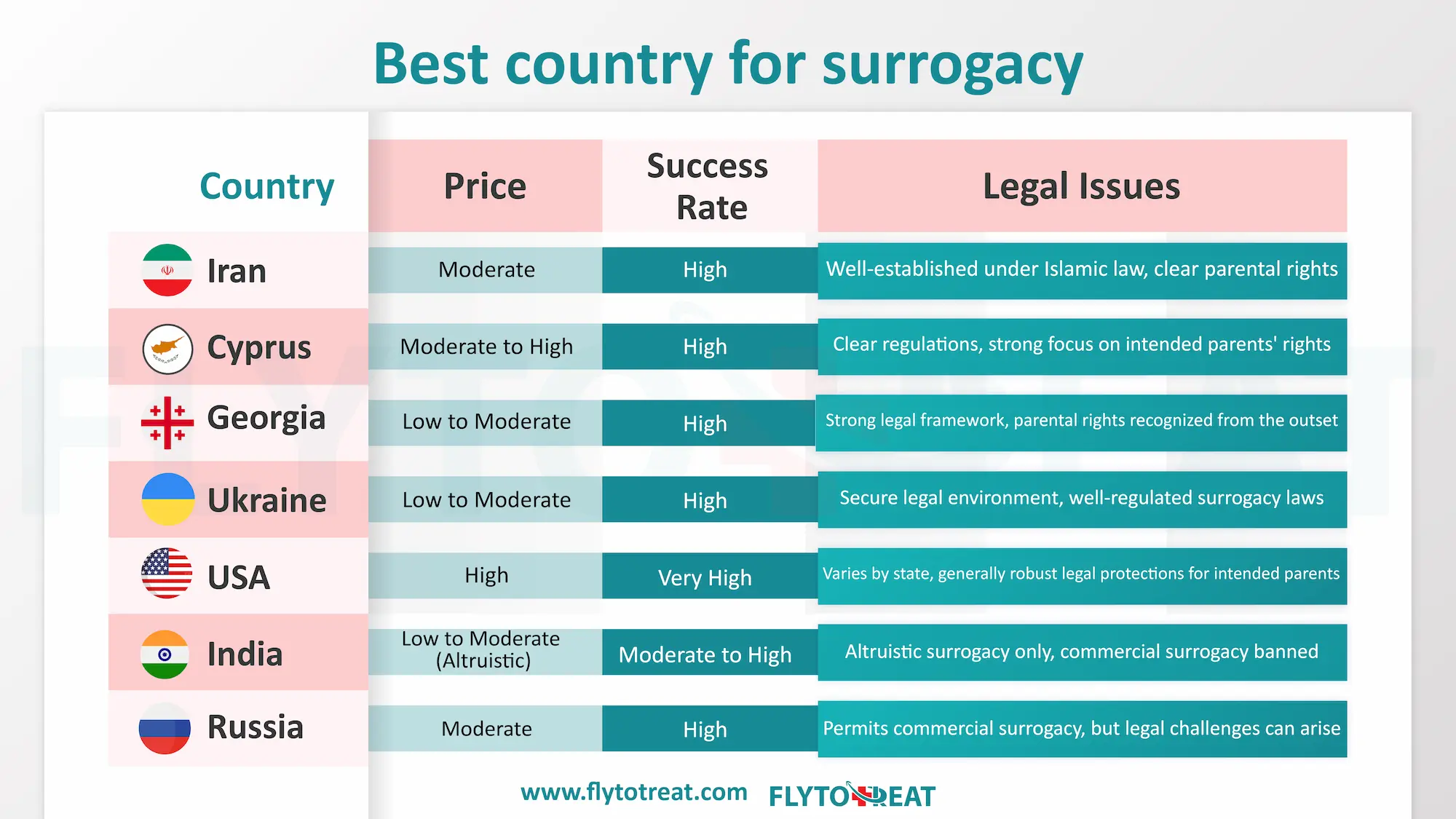
2025 Surrogacy Legal in Which Countries
Figuring out which countries allow surrogacy and understanding their different laws can be confusing. This article will help explain the most important things to know about surrogacy. Here we delve into questions such as "Which countries allow surrogacy" and "Countries that allow commercial surrogacy." Whether you're considering surrogacy in Europe, Asia, or North America, understanding the legal frameworks is crucial. FlyToTreat is here to guide you through the options and help you make informed decisions.
Countries where surrogacy is banned
Surrogacy is banned in several countries around the world, often due to ethical, legal, or cultural concerns. The following surrogacy banned countries emphasize the importance of understanding local laws before pursuing surrogacy in different countries.
• Europe: Countries like Germany, France, Sweden, and Italy where surrogacy is illegal, have strict laws that prohibit all forms of surrogacy, considering such agreements illegal and unenforceable.
• Asia: In China, Japan, and Saudi Arabia, surrogacy is completely banned, reflecting the region's traditional views on family and reproduction.
• Africa: Countries like Egypt also prohibit surrogacy, aligning with religious and societal norms that reject the practice.
• South America: Brazil and Argentina have banned commercial surrogacy, though altruistic surrogacy might be permitted under strict conditions.
For those considering surrogacy, it’s essential to research surrogacy legal countries or countries where surrogacy is legal to avoid legal complications.
Where is surrogacy legal?
Surrogacy is legal in several countries across the globe, each with its own specific regulations.
• North America: The United States is a leading surrogacy country, where both commercial and altruistic surrogacy are legal, though the laws vary by state. Canada permits only altruistic surrogacy.
• Europe: Countries like Greece and Ukraine allow surrogacy, with Ukraine being a popular destination for international surrogacy. The UK permits only altruistic surrogacy.
• Asia: Among Surrogacy legal countries in Asia, Iran is emerging as a new hub for surrogacy, especially in the Middle East. Georgia, Cyprus and Russia also allow commercial surrogacy.
• Oceania: In Australia, altruistic surrogacy is legal, but commercial surrogacy is banned.
These countries where surrogacy is legal provide various options depending on whether you seek altruistic or commercial arrangements. Understanding the specific laws of these surrogacy legal countries is crucial for intended parents considering surrogacy in different countries.
Where is surrogacy legal in Europe?
In Europe, surrogacy laws vary significantly across countries. Only a few countries allow some form of surrogacy. In the United Kingdom, Greece, and Portugal, altruistic surrogacy is permitted, where the surrogate does not receive financial compensation beyond reasonable expenses. Ukraine and Georgia are among the few European countries that allow commercial surrogacy, making them popular destinations for intended parents. However, many European nations, including France, Germany, and Italy, have strict bans on all forms of surrogacy. These countries consider surrogacy agreements void and unenforceable, often with legal consequences. Additionally, some surrogacy European countries have partial restrictions, such as Denmark and the Netherlands, where surrogacy is allowed but only under certain conditions. Understanding the legal landscape is crucial for anyone considering surrogacy in Europe.
Which countries allow commercial surrogacy?
Commercial surrogacy is allowed in several surrogacy countries legal for such arrangements. The United States permits commercial surrogacy in many states, making it a popular destination for intended parents. In Asia, Iran, Cyprus, Georgia and Russia are among the countries that allow commercial surrogacy, attracting international surrogacy seekers due to favourable legal frameworks. Ukraine is another surrogacy country where commercial surrogacy is legal and widely practiced. Understanding options of surrogacy in different countries is essential for those considering commercial surrogacy abroad.
Best country for surrogacy
The legal landscape surrounding surrogacy varies greatly across the globe, making it essential to explore different countries that allow surrogacy based on your specific needs and priorities. There isn't a single "best" surrogacy country, as each one offers unique advantages. For instance, Iran is emerging as a leader in the field, having established one of the earliest legal frameworks for surrogacy under Islamic law. Cyprus has also become a popular surrogacy destination, known for its clear regulations and emphasis on intended parents' rights. In Europe, countries like Georgia and Ukraine are recognized for their well-established surrogacy laws, which prioritize parental rights from the outset, providing a secure environment for intended parents.
Below is a table comparing different surrogacy countries based on price, quality, and legal issues:

This table provides a quick comparison of some key countries where surrogacy is legal, considering factors such as cost, quality of care, and legal stability.
Why is surrogacy banned in some countries?
Surrogacy, while legal in many places, is prohibited in others due to complex ethical and legal concerns. Here's a glimpse at some key reasons:
1. Ethical Concerns About Exploitation:
• Is commercial surrogacy exploitative? Critics argue that commercial surrogacy, where the surrogate is financially compensated, can exploit vulnerable women, particularly in countries with lower socioeconomic conditions.
• Who are the legal parents? Surrogacy raises complex legal questions regarding parental rights and potential disputes between intended parents and the gestational carrier.
2. Religious Objections:
• Does surrogacy violate religious beliefs? Some religions view surrogacy as interfering with the natural procreation process or commodifying children.
3. Regulation Concerns:
• Can surrogacy be ethically regulated? Concerns exist over unethical practices and the potential black market for surrogacy in countries with lax regulations.
The debate surrounding surrogacy is ongoing, with ethical, legal, and religious considerations all playing a role in the decision of each country.
Why is surrogacy illegal in Europe?
Surrogacy is illegal in many parts of Europe due to concerns over exploitation and ethical issues. The European Parliament has classified surrogacy under human trafficking, arguing that it commodifies women and children. This classification has led to strict regulations, with surrogacy banned countries in Europe viewing the practice as incompatible with human dignity. As a result, even in surrogacy allowed countries, the legal environment is highly restrictive, often limiting surrogacy to altruistic surrogacy country models or banning it altogether.
Surrogacy legal countries in Asia for foreigners
In Asia, several surrogacy legal countries allow foreigners to pursue surrogacy, but regulations vary.
Thailand is moving towards legalizing surrogacy for foreigners, providing new opportunities in the region.
Iran offers surrogacy options under Islamic law, attracting international attention due to its established legal framework.
India now permits only altruistic surrogacy for locals, having banned commercial surrogacy for foreigners.
Countries where surrogacy is legal in Asia present diverse options, but understanding local regulations is crucial before proceeding.
Conclusion
Understanding the legalities of surrogacy is essential for anyone considering this path to parenthood. This article has explored the diverse legal environments, from countries that allow surrogacy to those with stringent bans. Whether you're looking into altruistic or commercial arrangements, FlyToTreat is committed to providing the information you need to navigate the global surrogacy landscape successfully.
MEDICALLY REVIEWED BY: Dr. Ali Bazazi
AUTHOR: FlytoTreat's team of Authors
19 August 2024 - Updated At: 25 February 2025
Related Articles
Related Services
Comment









